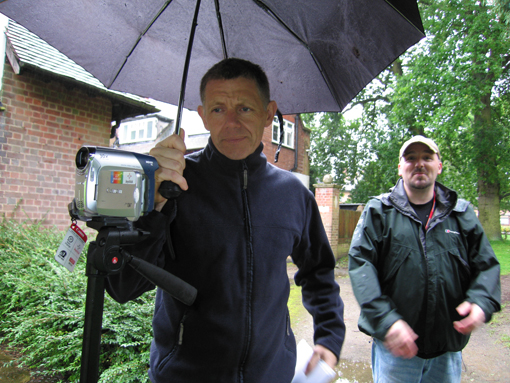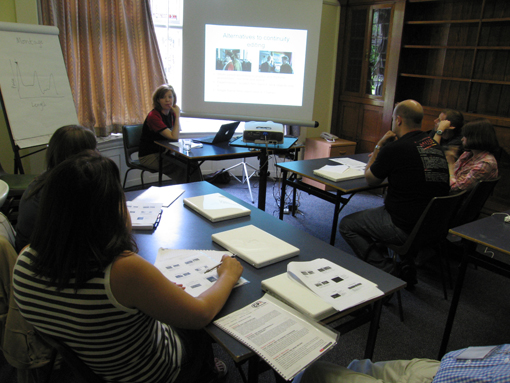A new resource aims to encourage and build an understanding and appreciation of moving images, in all forms, for those in full-time education. Its co-founder, Ian Wall, fills in the blanks.
Putting film at the heart of the curriculum In June 2013, Film Education, the main deliverer of teaching materials and teacher training on film in the UK, closed its doors after serving both teachers as well as the film industry for twenty-six years. Despite lack of funds, Ian Wall - who established Film Education in 1986, serving as Director of Education until it close - and James Lennox, previously Managing Director of Film Education, decided that the organisation’s important work needed to be continued. To this end we founded THE FILM SPACE, seeking to encourage and build an understanding and appreciation of moving images, in all forms, among young people in full-time education.
 THE FILM SPACE recognises the key role that teachers play in introducing children and young people to a wide variety of moving images; both as an art form, and as a way of exploring other curriculum areas. The resources that had been available to teachers on the Film Education website initially disappeared and our first task was to ensure the reinstatement of the site, which we managed to achieve with the support of the Film Distributors Association. We then proceeded, via the FILM SPACE website (www.thefilmspace.org/) to make available a raft of resources which had previously been unavailable to teachers – downloadable interactive resources, guidance papers on a range of subjects relating to the critical and creative use of film and approaches to studying film as film. Slowly but surely we are adding to this collection, ensuring that teachers have access to some of the best classroom materials available.
THE FILM SPACE recognises the key role that teachers play in introducing children and young people to a wide variety of moving images; both as an art form, and as a way of exploring other curriculum areas. The resources that had been available to teachers on the Film Education website initially disappeared and our first task was to ensure the reinstatement of the site, which we managed to achieve with the support of the Film Distributors Association. We then proceeded, via the FILM SPACE website (www.thefilmspace.org/) to make available a raft of resources which had previously been unavailable to teachers – downloadable interactive resources, guidance papers on a range of subjects relating to the critical and creative use of film and approaches to studying film as film. Slowly but surely we are adding to this collection, ensuring that teachers have access to some of the best classroom materials available.
We believe that the study of film in its own right is vitally important. In England, advocates of film education frequently place the emphasis not on the study of film itself but instead look to it as delivering a wide range of other education outcomes. Typical outcomes often include the following:
- Film is about active learning. The best film education includes discussion, presentation, critical thinking, team working and filmmaking, as well as watching.
- Film engages young people in learning. Film stretches the most gifted and engages the hardest to reach.
- Film can be used across the entire curriculum. Many teachers find that film can help to raise the profile of their subject within their schools.
- Film teaches young people many skills. The most valuable film education activities enhance critical, cultural and creative abilities.
- Film education extends young people’s cultural knowledge. Film teaches them about diverse cultures, in Britain and beyond.
- Film education provides young people with skills employers want. These benefits justify continued public investment.
- Film can help government achieve its educational objectives.
While these outcomes will be beneficial, we feel that any other subject in the curriculum could be substituted for the word ‘film’ and the outcomes would be just the same. All too often film educators promise teachers and informal providers that film education is worthwhile because it will help with literacy or with attendance figures. Whilst this is a useful way into the curriculum, it can marginalise the study of film as film, suggesting that it can only enter the learning space as a ‘stimulus’ or ‘support’ to something more important or higher on the educational agenda. We suggest that the case should be argued both ways: that film education is essential on its own account, and that it helps with other learning too.

The approach that we take is best summed up by the definition proposed in the recent Screening Literacies research project (funded by the EC - 2011):
The level of understanding of a film, the ability to be conscious and curious in the choice of films; the competence to critically watch a film and to analyse its content, cinematography and technical aspects; and the ability to manipulate its language and technical resources in creative moving image production
By adopting this approach we are able to place the actual study of film within a variety of curriculum subjects but always starting from the filmic and applying this approach to the curriculum requirements of the specific subject. In History, for example, a film, be it feature or documentary, would be studied as source material and questioned in such a way as to raise issues regarding its production, message and how it is conveyed, audience etc.
Such an approach, while seemingly straightforward, does face a number of challenges. While the arts and cultural sectors embrace novelty, the educational sector does not. The slowness of change in education is a source of frustration to politicians tied to terms of five years or less, as well as to funders who need to measure impact within the space of a few months. They find it hard to accept that enthusiasm at the beginning of high-profile initiatives or excitement at the celebratory conclusions of ‘one-off’ projects do not necessarily guarantee that real learning has taken place.
Film has become associated in the news media’s mindset with fun and glamour. To argue a place for film in ordinary classrooms either sounds too serious and glum, or dangerously time wasting and frivolous. So, with this in mind we have set ourselves the following tasks:
We hope to empower educators, practitioners and youth workers to feel confident in using film, in both formal and informal education settings, by improving their skills to deliver both a critical and creative perspective through training and resources.
We will give practitioners methodologies for approaching a formal education setting in ways that realise the requirements of the school curriculum. Furthermore we want to encourage them to deliver sustained involvement in long term projects and to break away from models of short term, one-off opportunities for working with children and young people that in the past have led to an inconsistent provision.

We believe that as well as developing children and young people’s experience of and engagement with film, we will also be developing a greater cultural appreciation of the medium amongst core audiences including teachers, youth workers, practitioners and parents, expanding their tastes in and understanding of film and showcasing the possibilities film offers for both learning and cultural enrichment throughout life.
We believe that the way forward in developing the scheme is through dialogue and partnership and we are already working with a number of organisations and universities to help establish meaningful programmes of resource supported activities, which will start to embed the study of film within and across the curriculum. Again, we stress the study of film.
In order to create an environment for film in schools, we believe that we need to:
- Promote innovative thinking about how best to engage children and young people in learning about film.
- Working with others, develop film specific aims, objectives and learning outcomes.
- Explore curriculum issues regarding the introduction of the study of film as a learning and cultural experience of value in its own right as well as contributing to the study and understanding within other curriculum subjects – History, English, Modern Foreign Languages, Literacy.
- Research, develop and promote teaching resources and other support to the strength and spread of film education in the UK.
- Expand and enrich the ways in which children and young people are exposed to a wider film culture.
If watching films is a central activity of the scheme then learning about film and using film to support learning and attainment will be a key factor in enabling children and young people to extend their viewing choices, to experiment and take risks and to become part of a film community.
So, with the advent of the new academic year we have quite a task before us. We hope that some of you will be willing to join us in developing this programme. Please do not hesitate to get in touch!
Ian Wall